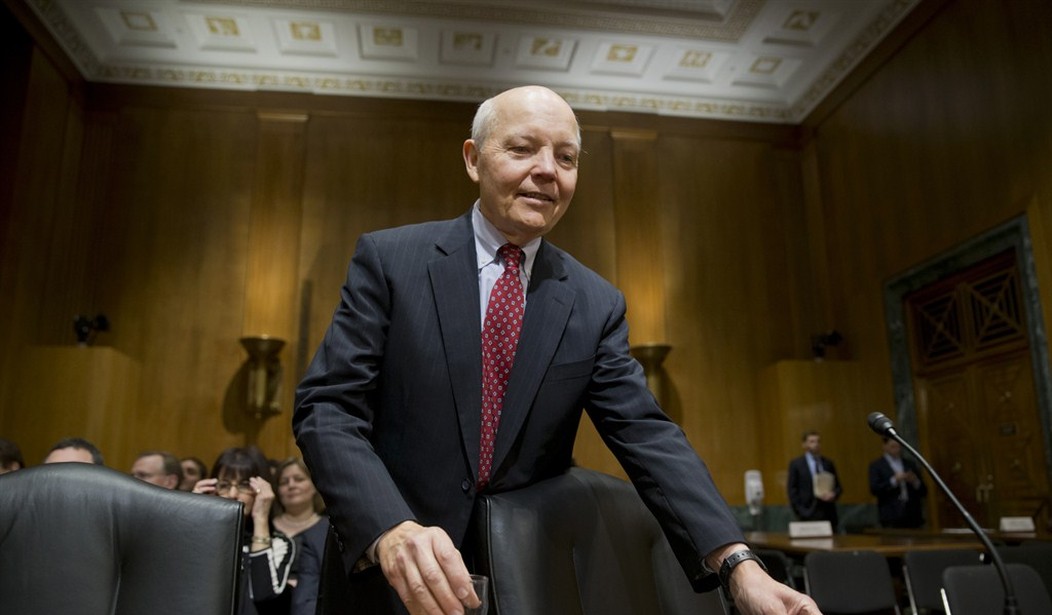The House will soon consider H.R. 3865, which would prohibit the IRS from rushing a final rule regulating 501(c)(4) organizations in the middle of the current tax year. If the floor debate looks like the bill's markup in the Ways and Means Committee, it will be split right down party lines.
Republicans will condemn the IRS 501(c)(4) muzzle rule as a violation of free speech rights and an extension of the IRS targeting scandal by official means. Democrats will complain that the IRS targeting scandal has been exaggerated and insist the rule is an appropriate response to the horrors of "dark money." They will say "Koch brothers" a lot. Then they will all vote to let the IRS proceed.
If that is indeed what happens, it will be a sad commentary on the extent to which Democratic House members are willing to ignore their constituents to serve as a rubber stamp for President Obama's IRS.
Consider the comments from the ACLU, which is extremely critical of the proposed IRS rule: "Most social welfare organizations - on both the left and right - serve exactly that function as they see it, the promotion of social welfare and community good... and they should be able to do so freely, without fear of losing or being denied tax-exempt status, even if doing so could influence a citizen's vote. Such advocacy is at the heart of our representative democracy."
Cathy Duvall, the Sierra Club's director of strategic partnerships, told the Washington Post the proposed rule "harms efforts that have nothing to do with politics, from our ability to communicate with our members about clean air and water to our efforts to educate the public about toxic pollution."
Recommended
The liberal umbrella Alliance for Justice is even more critical, writing: "Though the new definitions attempt to clarify existing rules, they also create a danger to citizen participation in our democracy... the rules would drastically reduce the ability of (c)(4)s to engage in nonpartisan get-out-the-vote drives, candidate questionnaires, and voter registration drives. These activities have been critical to the ability of nonprofits to influence the public policy debate on a wealth of issue."
The League of Conservation Voters recently rang an alarm bell, saying: "The devil is in the details. We want to make sure that any final rules do the right job of curtailing shadowy 'c4s' and don't end up hurting legitimate groups who represent large public constituencies."
As grassroots activists across the political spectrum have flooded the docket with an unprecedented number of comments opposing the proposed rule, the liberal group Common Cause sent out a call to its activists to send in supportive comments.
Yet, remarkably, even Common Cause notes in its model comments that the rule as proposed is flawed, saying: "the proposed rules are imperfect because they count critical civic engagement efforts like nonpartisan voter registration and nonpartisan get-out-the-vote activities as 'candidate-related political activity' and should be exempted from the definition."
While many liberals would like to see IRS rulemaking in this area, there is not a single group that is comfortable with the current proposed rule. Not one.
H.R. 3865 only prohibits the IRS from issuing a final rule in the middle of the current tax year. It does not stop them from moving forward in a deliberate way, giving due consideration to serious concerns from the public. The bill would ensure that the agency does not regulate prematurely, trampling the rights of liberal grassroots groups as well as conservatives.
We know why Senate Democrats want the IRS to muzzle 501(c)(4) groups as soon as possible - to silence their critics and improve their reelection chances in November.
Soon we'll find out if there are any House Democrats who are willing to break with that crass political calculation and stand up for their constituents by slowing down the IRS's rush to regulate.

























Join the conversation as a VIP Member